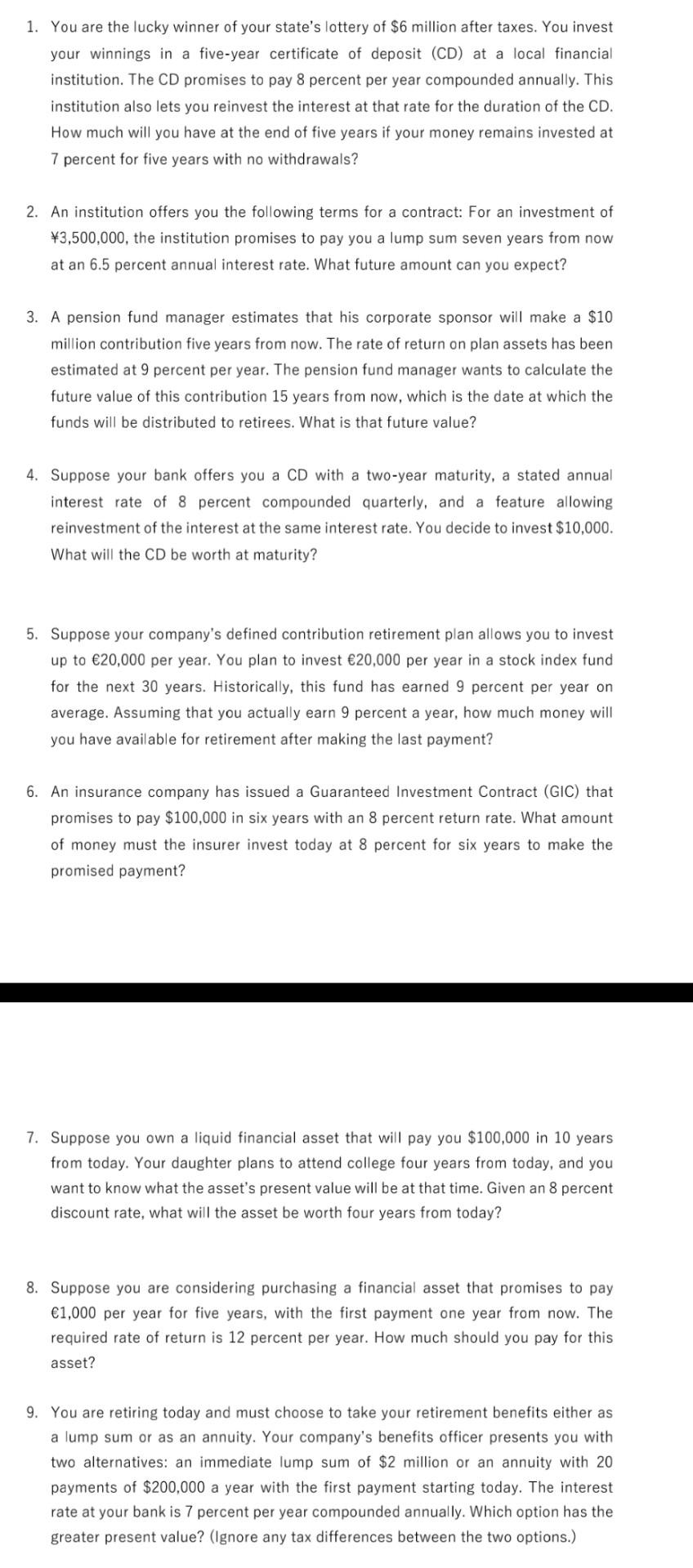Answered step by step
Verified Expert Solution
Question
1 Approved Answer
1. You are the lucky winner of your state's lottery of $6 million after taxes. You invest your winnings in a five-year certificate of deposit

1. You are the lucky winner of your state's lottery of $6 million after taxes. You invest your winnings in a five-year certificate of deposit (CD) at a local financial institution. The CD promises to pay 8 percent per year compounded annually. This institution also lets you reinvest the interest at that rate for the duration of the CD. How much will you have at the end of five years if your money remains invested at 7 percent for five years with no withdrawals? 2. An institution offers you the following terms for a contract: For an investment of 3,500,000, the institution promises to pay you a lump sum seven years from now at an 6.5 percent annual interest rate. What future amount can you expect? 3. A pension fund manager estimates that his corporate sponsor will make a $10 million contribution five years from now. The rate of return on plan assets has been estimated at 9 percent per year. The pension fund manager wants to calculate the future value of this contribution 15 years from now, which is the date at which the funds will be distributed to retirees. What is that future value? 4. Suppose your bank offers you a CD with a two-year maturity, a stated annual interest rate of 8 percent compounded quarterly, and a feature allowing reinvestment of the interest at the same interest rate. You decide to invest $10,000. What will the CD be worth at maturity? 5. Suppose your company's defined contribution retirement plan allows you to invest up to 20,000 per year. You plan to invest 20,000 per year in a stock index fund for the next 30 years. Historically, this fund has earned 9 percent per year on average. Assuming that you actually earn 9 percent a year, how much money will you have available for retirement after making the last payment? 6. An insurance company has issued a Guaranteed Investment Contract (GIC) that promises to pay $100,000 in six years with an 8 percent return rate. What amount of money must the insurer invest today at 8 percent for six years to make the promised payment? 7. Suppose you own a liquid financial asset that will pay you $100,000 in 10 years from today. Your daughter plans to attend college four years from today, and you want to know what the asset's present value will be at that time. Given an 8 percent discount rate, what will the asset be worth four years from today? 8. Suppose you are considering purchasing a financial asset that promises to pay 1,000 per year for five years, with the first payment one year from now. The required rate of return is 12 percent per year. How much should you pay for this asset? 9. You are retiring today and must choose to take your retirement benefits either as a lump sum or as an annuity. Your company's benefits officer presents you with two alternatives: an immediate lump sum of $2 million or an annuity with 20 payments of $200,000 a year with the first payment starting today. The interest rate at your bank is 7 percent per year compounded annually. Which option has the greater present value? (Ignore any tax differences between the two options.)
Step by Step Solution
There are 3 Steps involved in it
Step: 1

Get Instant Access to Expert-Tailored Solutions
See step-by-step solutions with expert insights and AI powered tools for academic success
Step: 2

Step: 3

Ace Your Homework with AI
Get the answers you need in no time with our AI-driven, step-by-step assistance
Get Started


